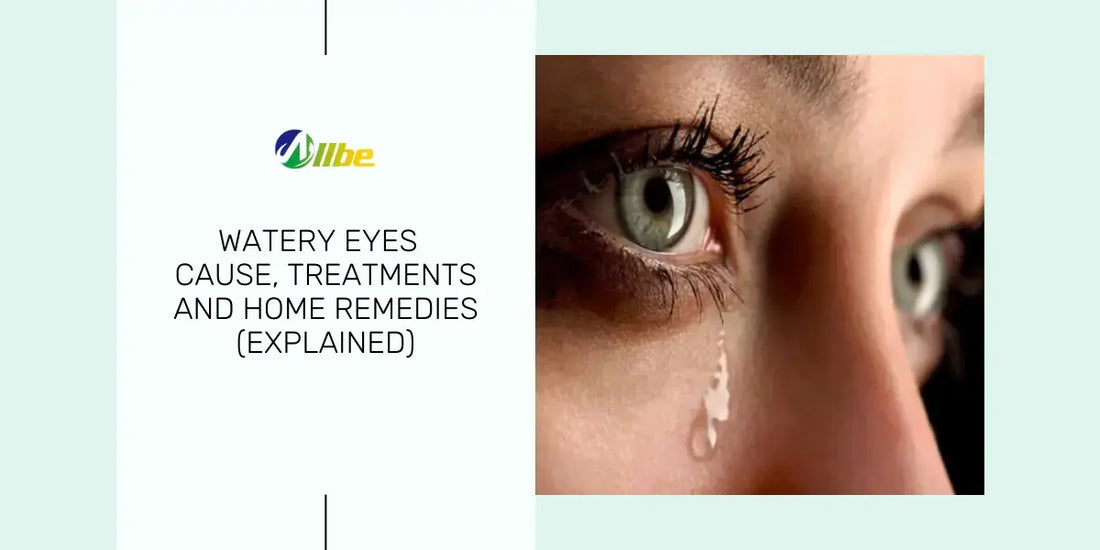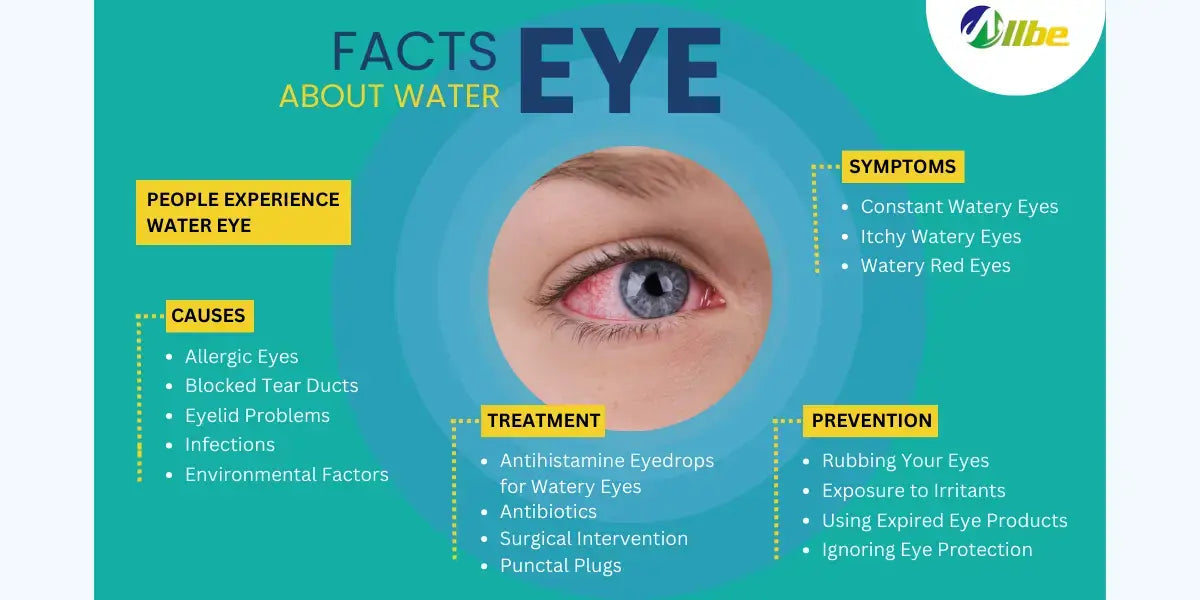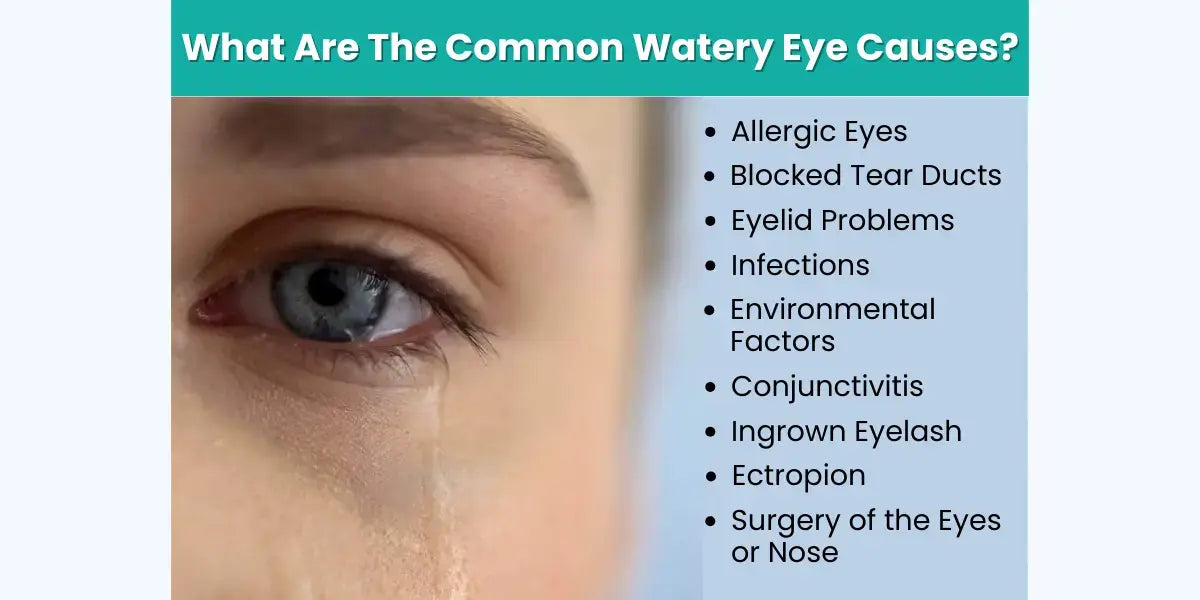
Watery Eyes | Cause, Treatments, and Home Remedies (Explained)
Watery eyes, a common discomfort experienced by many, can be more than just a mere inconvenience. Understanding watery eyes' causes and effects is crucial for everyone, whether a fleeting irritation or a constant companion. This condition, often accompanied by symptoms like watery red or constant watery eyes, can significantly impact daily activities and overall quality of life.
Knowing how to prevent watery eyes is just as important as learning how to treat them. Simple changes in lifestyle, protective eyewear, and being mindful of eye health can help prevent this issue. And when it comes to treatment, there are plenty of options, from home remedies to medical solutions, helping everyone find relief and lead a more comfortable life.
What are Watery Eyes?

Watery eyes, medically known as epiphora, occur when the eyes produce tears excessively or when tears cannot drain away properly. It’s a common condition experienced by individuals of all ages and often resolves without treatment. Understanding the watery eyes meaning involves recognizing it as a symptom rather than a disorder, highlighting an underlying imbalance or irritation in the eye area.
Our eyes naturally produce tears through the lacrimal glands to maintain eye health. These tears play a crucial role, providing lubrication, reducing the risk of eye infection, washing away foreign particles, and keeping the eye surface smooth and clear. In normal circumstances, tears are drained away through small drainage ducts located in the corners of the eyes. When this balance between tear production and drainage is disrupted, it leads to watery eyes.
What Are The Common Watery Eye Causes?

Allergic Eyes:
Understanding allergic eyes is crucial as they are a common cause of watery eyes. Allergies can make the eyes react to certain substances, leading to itchy watery eyes. Pollen, dust, or pet dander can provoke this reaction, causing discomfort and excessive tear production.
Blocked Tear Ducts:
Blocked tear ducts, responsible for tear production, can significantly contribute to watery red eyes. When the tear drainage system is obstructed, tears cannot drain normally, leading to an overflow of tears onto the face.
Eyelid Problems
Malposition or weakness of the eyelids can also be one of the watery eye causes. When eyelids cannot function properly, it might result in tear overflow or even expose the eye surface to environmental irritants.
Infections:
Eye infections can result in constant watery eyes. Bacterial, viral, or fungal infections can irritate the eye, leading to excessive tear production as the body's response to combat the disease.
Environmental Factors:
Exposure to wind, dust, smoke, and bright light can lead to eyes stinging and watering randomly. These factors can irritate the eye surface, triggering an increased production of tears as the eyes attempt to wash away the irritants.
Conjunctivitis
Inflammation or infection of the outer membrane of the eyeball, known as conjunctivitis, often results in watery and itchy eyes. It's a common condition that can occur due to allergies, viruses, or bacteria, and it requires appropriate treatment to prevent complications.
Ingrown Eyelash (Trichiasis):
An ingrown eyelash can irritate the eye, causing excessive tear production. Trichiasis can be painful and, if left untreated, can lead to further complications.
Ectropion:
Ectropion is when the lower eyelid turns outward, exposing the inner surface to air and environmental irritants, often leading to watery and irritated eyes. Proper medical intervention is crucial to address the underlying causes and manage the symptoms effectively.
Surgery of the Eyes or Nose:
Any surgical procedure involving the eyes or nose can affect the tear drainage system, leading to watery eyes post-surgery. It's usually temporary but requires careful postoperative care and follow-ups to ensure proper healing and recovery.
Symptoms Accompanying Watery Eyes
|
Symptoms |
Description |
Causes |
|
Constant Watery Eyes |
Continuous tearing, occurring without any apparent reason |
Blocked tear ducts, infections, ectropion |
|
Itchy Watery Eyes |
Excessive tearing accompanied by an itching sensation |
Allergies, conjunctivitis |
|
Watery Red Eyes |
Over-tearing with visible redness in the eyes |
Eye strain, irritants, infections |
Understanding the symptoms and their variations is pivotal in tracing back to the possible underlying causes of watery eyes. For instance, constant watery eyes may indicate a blockage in the tear ducts or could result from eye infections, suggesting different lines of treatment for each cause.
Itchy watery eyes often hint at allergic reactions or conjunctivitis, necessitating antihistamines or anti-inflammatory medication. Similarly, watery red eyes might be a sign of external irritants or strain, requiring removal of the irritant or rest for the eyes. Recognizing these subtle differences in symptoms is essential to employ the correct intervention and address the root of the problem effectively.
Are Watery Eyes A Concern?
While watery eyes are typically a common and benign condition, often resolving independently or with minimal intervention, they can sometimes cause concern. Persistent or excessive watering, especially when accompanied by other symptoms like pain, redness, or vision loss, may indicate underlying health issues such as infections, allergies, or more severe eye conditions. In such cases, seeking prompt medical attention is crucial to address potential concerns and prevent complications.
When is Watery Eyes Serious?
Watery eyes become a severe concern when accompanied by symptoms like pain, reduced vision, or sensitivity to light. If the excessive tearing persists and is not alleviated by home remedies or over-the-counter solutions, it might indicate underlying conditions such as infections, blocked tear ducts, or more severe eye conditions.
In such cases, immediate consultation with an eye care professional or a healthcare provider is crucial for an accurate diagnosis and appropriate treatment.
How to Stop Watery Eyes Home Remedies
- Cold Compress: A cold compress can relieve inflammation and soothe watery eyes.
- Clean Eyes: Regularly washing your eyes with clean, cool water can help remove irritants.
- Eye Supplements: Consuming eye supplements rich in Omega-3 fatty acids, Vitamin A, and Vitamin E can promote eye health and possibly reduce symptoms of watery eyes.
- Cucumber Slices: Place cool cucumber slices over your eyes to soothe irritation and reduce watering.
- Rose Water: Rinse your eyes with rose water to alleviate discomfort due to its anti-inflammatory properties.
- Chamomile Tea Bags: Place cooled chamomile tea bags on your eyes. Its anti-inflammatory properties can reduce symptoms.
Watery Eyes Treatment
- Antihistamine Eyedrops for Watery Eyes: Over-the-counter antihistamine eye drops can relieve symptoms like itching and watering associated with allergic reactions.
- Antibiotics: Antibiotics can be prescribed to alleviate symptoms if the cause is a bacterial infection.
- Surgical Intervention: For cases like blocked tear ducts or ectropion, surgery might be recommended to rectify the issue.
- Punctal Plugs: These are small devices inserted into tear ducts to block drainage, increasing the eye’s tear film and surface moisture.
Things To Avoid For Watery Eyes-Preventive Measures
- Rubbing Your Eyes: Rubbing can introduce dirt and bacteria, increasing the risk of infections and irritating the eyes further.
- Exposure to Irritants: Avoid smoke, strong winds, chlorinated water, and excessive light, as they can exacerbate eye-watering.
- Using Expired Eye Products: Expired eye makeup or eye care products can harbor bacteria and cause irritation.
- Ignoring Eye Protection: Failing to wear protective eyewear during activities that expose eyes to risk can lead to injury and watering.
- Excessive Screen Time: Prolonged exposure to screens can cause eye strain and increase tear production.
- Neglecting Hydration: Dehydration can affect tear production, so inadequate water intake should be avoided.
Frequently Asked Questions:
Why Do My Eyes Water When I Have A Cold?
Eyes water during a cold due to the body's response to fight off the virus. The nasal cavity is connected to the tear ducts, so congestion and excess mucus production can lead to blocked tear ducts and, consequently, watery eyes.
Q: Why Do My Eyes Water When I Yawn?
When you yawn, facial muscles, including those around your eyes, tighten, putting pressure on the tear glands (lacrimal glands) and forcing them to release tears, leading to watery eyes.
Conclusion
So, we’ve seen that having watery eyes, though common, can be quite a nuisance! It’s crucial to know why it happens, whether it’s due to a gust of wind, an allergy, or something more serious. There are plenty of simple remedies and medical treatments to try, but if those watery eyes persist, it’s time to see a professional. Remember to keep our eye health a priority—after all, our eyes are our windows to the world! Keep them clear and keep them healthy!
